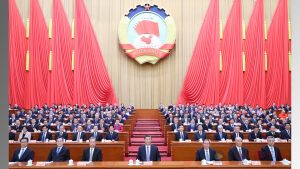
Nepal’s Waning Confidence in China Signals Shift in Geopolitical Dynamics

Nepal seems to be losing interest and confidence in China due to concerns about the sustainability of the Belt and Road Initiative (BRI), the negative effects of Chinese social media apps, encroachment on Nepalese territory, and criminal syndicates operated by Chinese elements. The recent stance taken by the Nepal government, not endorsing the BRI and President Xi Jinping’s security doctrine, speaks volumes about China’s declining influence in the Himalayan country.
Nepal unexpectedly and without notice banned the Chinese social media app TikTok. Nepalese Minister Rekha Sharma stated, “Our social harmony, family structure, and family relations are being disturbed by social media, by TikTok. The decision to ban TikTok will be effective immediately.” While Nepal did not provide an exact reason for the ban, concerns over national security may have triggered the instant prohibition.
Many countries, including its neighbor India, have banned TikTok, citing threats to their national security. Even China’s all-weather friend Pakistan has temporarily banned the Chinese app on several occasions. Security experts claimed that TikTok shares personal and sensitive data with the Chinese government and promotes pro-Beijing propaganda.
A committee appointed by the Nepal government found that China has built structures inside the country’s territory. “The Chinese side has constructed structures on Nepali land in Humla and engaged in various forms of obstruction,” read the report. China is estimated to have occupied 621 hectares of Nepalese land and forced Nepalese farmers to stop grazing.
Nepalese people have been protesting against repeated encroachment attempts by China for the past few years. Slogans such as “Return Nepal’s land,” “Go back China,” and “Stop Chinese expansionism!” have been raised on the streets and on social media, leading to growing anger in Nepal.
China destroyed or shifted pillars on the international border before constructing buildings and roads inside Nepal. Chinese soldiers intervened, forcing Nepalese officials to leave the area when they went to verify the encroachment reports. Nepal had to cede Rui village to China in 1962 despite the records of land revenue, causing growing insecurity among the Nepalese people about China’s incursion in Nepal.
Chinese media even once claimed that Mount Everest was a part of China amid reports of encroachment on 33 hectares of land and incursion by Chinese soldiers in the Everest region. The news was deleted soon after, but it irked and scared Nepalese people. Nepali Congress Vice-president Bimalendra Nidhi called them “dangerous Chinese activities.” Echoing a firm stance against any infringement, local political leader Jeewan Bahadur Shahi said, “Nepal strongly rejects any encroachment upon its territory.”
In recent years, Nepalese police have arrested many Chinese individuals for serious crimes ranging from banking fraud to human trafficking. Chinese hackers were apprehended using cloned ATM cards in Nepal, leading to protests outside the Chinese Embassy condemning the trafficking of Nepali women by Chinese nationals. However, there has been no improvement.
The Chinese-built Pokhara International Airport has failed to receive regular international flights since its inauguration in January 2023. Now, it risks becoming a white elephant like the Mattala Rajapaksa International Airport in Sri Lanka. Nepal fears falling into a debt trap like Sri Lanka did, as the failure to generate revenue would make it unable to repay Chinese loans, according to Chinese democratic activist and author Jianli Yang.
Nepal’s government sensed further trouble when China refused to change loans into grants. This refusal adds to Kathmandu’s financial burden. “Nepal’s reluctance may be due in part to the failure of existing Chinese projects,” Yang said. Kathmandu has now initiated an inquiry into the Pokhara airport, with preliminary findings indicating that the project’s infrastructure did not meet standard requirements.
Now, Nepal seems to be inclining back toward India as Kathmandu contemplates the opportunities and risks that China’s growing footprint presents, especially amid growing concerns over the BRI and its financing model. Independent researcher Dr. Sudha Ramachandran stated that Beijing’s capacity to influence Nepal’s policy and decision-making has eroded. “This decline could impact China’s strategic and economic interests in several ways,” she wrote in a report published by the Jamestown Foundation. Nepalese political activist Chandra D Bhatta said, “It appears that China fears losing the plot in Nepal, so Nepal’s increased and engaged relations with other countries are not to China’s liking anymore.”














Comments